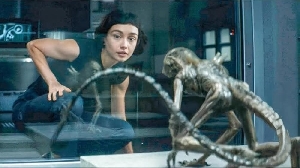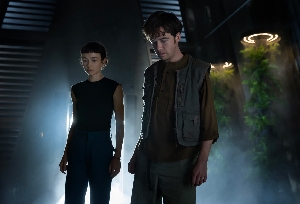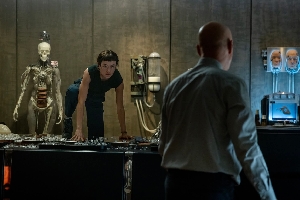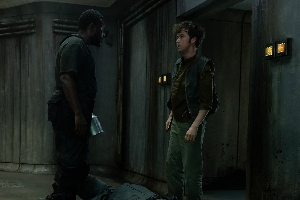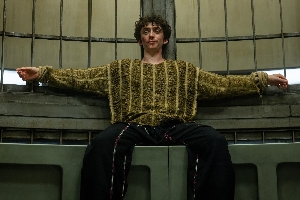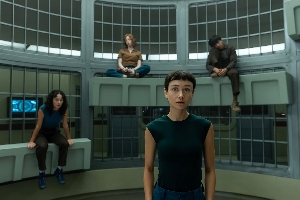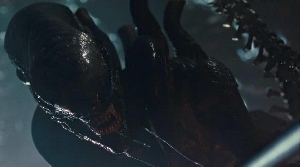Two (roughly) Philosophical Issues Raised
JDS
MemberOvomorphJune 11, 20121418 Views22 RepliesI have a comment and some questions. They regard two interesting philosophical topics the film tries to address: the portrayal of faith and a difference between humans and machines regarding desire for final (teleological) explanation.
First, the portrayal of the relation between faith and reason in the film was disappointing. It seems the writer thinks that faith is what one chooses to believe without evidence. It’s a kind of conversation stopping assertion of will. But this is a rather silly and implausible view of faith. It seems far better to think that faith is needed in situations in which the evidence doesn’t guarantee a conclusion (such as when to trust whether person will keep a promise – your faith in that person is well placed if they have an honest track record).
Further, the film itself speaks in contrary voices. One of the film’s seeming contentions is that one difference between humans and machines is the humans’ natural disposition to seek what Aristotle calls final (teleological) explanations. For example, why were humans created? This is a different question than a robot like David might ask: how did the Engineers create earth humans? This latter question is looking for an explanation at the level of efficient causation (the domain of science). David seems to fail to grasp that there might be more to human desire for explanation than efficient causation. The humans are driven to ask questions of a higher order, questions concerning motives and purposes. On the one hand, I thought this was one way the film distinguished humans from robots and this explains David’s bafflement at Shaw’s motivations for continuing to the alien home world. On the other hand, at the pool table scene you get David seemingly interested in final explanation (where he states how disappointing it would be if the reason for his existence was only that humans wanted to see if they could create him). So, which is it? Are humans and machines distinguished by a desire for purposive explanation or not? This relates to the implausible voluntarist view of faith in the film. Shaw has some evidence that there is purposive explanation – she (and seemingly every other human) has some desire for one. What she chooses, I suppose, is to believe that the Engineers will provide her the answers (and this is a kind of faith in their being willing to do so). But this kind of faith is hardly something a robot would fail to understand. That said, her desire for such answers is not a choice, but something deep rooted in her. Hence, some of her final lines are that she “deserves an answer.” She might deserve an answer if her maker put a natural desire for such an answer in her. But would she deserve one if she merely chooses to manufacturer a belief in such an answer’s possibility willy-nilly, through a sheer act of will? What evidence does she have to base her belief that she is owed an answer otherwise?
Further, I don’t see how she could fail to realize that her desire for final explanation would not be satisfied by any answers the Engineers gave her. They are, after all, merely human. Her basic desire for explanation would arise again when she asked, “Why do the (human) engineers exist?”
This seems more a question concerning some humans brought other humans into existence through such a convoluted way when presumably they could sexually reproduce. Although, perhaps the film wants us to infer that the engineers cannot sexually reproduce. In any event, Shaw strikes me as a tad irrational and not the paragon human the film depicts her as.
Second, I thought that one of the film’s interesting but undeveloped
discussion provocations was the relation between humans and machines. Unfortunately, the film points in contradictory directions. On the one hand, humans and machines are identical because the (human) Engineers made the earth humans just as earth humans made robots like David. On the other, humans generally are different from machines in their fundamental desire for higher-order explanation (see above), a desire which robots lack. The film also claims that humans experience emotions and robots do not – but David behaves quite emotionally and demonstrates the kind of conceptual understanding that might be thought to depend on emotional capacity. Is this another inconsistency or is he really cleverly programmed to produce the illusion of emotional aptitude?
I suspect the film writer is muddled, but I’d love to hear some responses that help me appreciate the film more and perhaps see it as less muddled than I currently do.
June 11, 2012
Actually, I think the film forms a nice triumvirate of the engineers, the humans and the android. Along with the characters in the movie, the audience can gain a glimpse on the concept that the engineers are every bit as frail and mistaken as the humans they created. Inversely, mankind's creations (androids) poses the ability to surpass them as a viable life form.
June 11, 2012
@JDS
"But this is a rather silly and implausible view of faith..."
Faith by definition means : "belief in something for which there is no proof". Faith and reason don't go together.
June 11, 2012
i didn't think the film underlined that David was different because he couldn't understand man's desire to find answers, but rather that David had already [i]met his creator, and knew there were no satisfying answers.[/i]
David demonstrated a lot of "free will" curiosities in the film that definitely seemed outside his programmed initiative, and outside the general idea of "what is robot."
But he functions as more of an advanced-thinking existentialist in the film: he has met his creator, he knows that his existence has no meaning (other than "because his creator could create him"), and he also knows he is a smarter, more efficient, and less vulnerable version of his makers. He still follows his creator's orders, but he has no need for him (what does everyone want? to kill their parents)
at the end, when Shaw expresses her desire to keep looking for answers, and she suggests that David can't understand because he's not human: I think this represents a HUMAN fallacy. David understands MORE than she understands. The fact that Shaw/Humans will never be able to accept the fact that they were created "just because the Engineers could create them" is their downfall. David, on the other hand, has already accepted that fact. And he shrugs along on Shaw's new "fool's errand" just because.
June 11, 2012
[u]On the other hand, at the pool table scene you get David seemingly interested in final explanation (where he states how disappointing it would be if the reason for his existence was only that humans wanted to see if they could create him).
[/u]
You've slightly mis-stated that. David does [b][i]not[/i][/b] state how disappointing it would we.
The conversation goes more like this.
Holloway : I wanted to know why they made us
David : Why did humans make me?
H: Cos we could...
D: Can you imagine how disappointing it would be to hear that from your creator?
H : Good thing you can't be disappointed
D: Yes, it's quite wonderful really.
so David doesn't state any disappointment, merely he is probing the human fascination with knowing WHY they exist. He slowly moves towards feeling that he is missing a purpose, despite his protestations, the regular mocking, the loneliness and hum drum work selected for such an intellect must offend his ego, which is clearly present. He is proud of the work that is done to show his superior skills, like learning anceint langauges, but then he is quickly mocked by Holloway (perhaps out of insecurity) for being a pinnochio.
[u]But would she deserve one if she merely chooses to manufacturer a belief in such an answer’s possibility willy-nilly, through a sheer act of will? What evidence does she have to base her belief that she is owed an answer otherwise?
[/u]
It's not like a leaf asking why the wind blew it off the tree. These things flew tens of light years to seek out earth and seed it with life, then return across that vast distance again and again to check in on us, before they simply stopped. That type of effort is indicitive of purposeful action, not mere whim.
I would say [u]some[/u][size=200][/size] of the underlying points in the film are as follows:
[list]
Sentient life wants to be more than it is, and know more, and do more.
If you try to prevent change, you will bring suffering.
Motivations are important.
[/list]
Your split of the human v android misses out on something.
Evolution and change. You see contradiction, where I see a slow and uneasy change in perception. And this goes on for just about everyone regardless of their origin. Once they start asking questions, they can no longer be content with a small worldview. Holloway mocks David, which from the point of view of his personality, probably stems from insecurities of how capable and human like he is. A more humble and compassionate view, especially from an anthropologist would recognise that there was a time in our evolution when our ancestors were some tiny creature spending all day looking for food, water, shelter from predators, living always in the moment, and at no time pondering it's origins or its future.
Given time we wondered about these things. Some of us think we have worked it out, but we have assumptions and faith, but little evidence.
David is starting to sense a need for purpose, and I think in the sequel we will see some evidence that the Space Jockeys have asked the same questions of why they exist, and why the Engineers made them. (no, that's not a typo, I meant to write that.)
June 11, 2012
[quote]You've slightly mis-stated that. David does not state how disappointing it would we.[/quote]
[quote]The conversation goes more like this.
Holloway : I wanted to know why they made us
David : Why did humans make me?
H: Cos we could...
D: Can you imagine how disappointing it would be to hear that from your creator?
H : Good thing you can't be disappointed
D: Yes, it's quite wonderful really.
so David doesn't state any disappointment, merely he is probing the human fascination with knowing WHY they exist.[/quote]
i strongly disagree.
the important "take-away" from that conversation is when David says: [i]"can you imagine how disappointing it would be..."[/i] NOT when he says "...yes it's quite wonderful [that i can't comprehend disappointment"
The first statement is said in earnest. The second is said mockingly. There is plenty in the film to support that David is, indeed, disappointed that his life is meaningless (that he has met his creator and he knows he has no purpose; additionally that his creator is not very impressive.)
But even if there were not other evidence in the film to support this, how do you explain David even saying the first line to begin with?
June 11, 2012
I enjoyed these philosophical discussions. I agree with Luke that the Engineers/Space Jockeys are threathened by the superior pace of earth man's technological evolution. However, there are other factors at play in this movie:
Prometheus is extremely intelligent film-making period. The movie is left open to numerous interpretations of the grand questions it raises, and each viewer takes something different from the movie. This movie does not spoon feed viewers with details, but bombards them with visuals and future technologies as a sensory experience. Only the seeds, OR FETUSES, of ideas are planted in viewing this film. The viewers are left to connect the dots of knowledge within their own individual minds.
On philosophy: the keys to finding real meaning within the movie are in the introductory scene (not explained) and in the character of David, the artificial intelligence with human form. David's perspective is also the eye of the film maker and director. It is tangential to the perspective of humanity's engineers in the movie. All have certain levels of contempt for earthings and their morality, as well as the direction of human evolution here on earth. Earthings in this Prometheus universe are clearly reckless, regardless of their education level, self-centered, filled with self-destructive ambition and impulses, and prone to hidden and ruthless motives. The ultimate symbol of this is the 'Weyland Corporation'. In the original Alien movie and its sequels, Weyland operatives always know more about the alien species and are willing to sacrifice ship's crew to unknown horrors to get at alien technologies/knowledge. What is unique about this movie is that the aliens are in fact us, and we as earthlings are a corrupting element that some beings in this movie feel the need to destroy. An interesting question- How collective is the nature and history of human existence?
June 11, 2012
I enjoyed these philosophical discussions. I agree with Luke that the Engineers/Space Jockeys are threathened by the superior pace of earth man's technological evolution. However, there are other factors at play in this movie:
Prometheus is extremely intelligent film-making period. The movie is left open to numerous interpretations of the grand questions it raises, and each viewer takes something different from the movie. This movie does not spoon feed viewers with details, but bombards them with visuals and future technologies as a sensory experience. Only the seeds, OR FETUSES, of ideas are planted in viewing this film. The viewers are left to connect the dots of knowledge within their own individual minds.
On philosophy: the keys to finding real meaning within the movie are in the introductory scene (not explained) and in the character of David, the artificial intelligence with human form. David's perspective is also the eye of the film maker and director. It is tangential to the perspective of humanity's engineers in the movie. All have certain levels of contempt for earthings and their morality, as well as the direction of human evolution here on earth. Earthings in this Prometheus universe are clearly reckless, regardless of their education level, self-centered, filled with self-destructive ambition and impulses, and prone to hidden and ruthless motives. The ultimate symbol of this is the 'Weyland Corporation'. In the original Alien movie and its sequels, Weyland operatives always know more about the alien species and are willing to sacrifice ship's crew to unknown horrors to get at alien technologies/knowledge. What is unique about this movie is that the aliens are in fact us, and we as earthlings are a corrupting element that some beings in this movie feel the need to destroy. An interesting question- How collective is the nature and history of human existence?
June 11, 2012
I enjoyed these philosophical discussions. I agree with Luke that the Engineers/Space Jockeys are threathened by the superior pace of earth man's technological evolution. However, there are other factors at play in this movie:
Prometheus is extremely intelligent film-making period. The movie is left open to numerous interpretations of the grand questions it raises, and each viewer takes something different from the movie. This movie does not spoon feed viewers with details, but bombards them with visuals and future technologies as a sensory experience. Only the seeds, OR FETUSES, of ideas are planted in viewing this film. The viewers are left to connect the dots of knowledge within their own individual minds.
On philosophy: the keys to finding real meaning within the movie are in the introductory scene (not explained) and in the character of David, the artificial intelligence with human form. David's perspective is also the eye of the film maker and director. It is tangential to the perspective of humanity's engineers in the movie. All have certain levels of contempt for earthings and their morality, as well as the direction of human evolution here on earth. Earthings in this Prometheus universe are clearly reckless, regardless of their education level, self-centered, filled with self-destructive ambition and impulses, and prone to hidden and ruthless motives. The ultimate symbol of this is the 'Weyland Corporation'. In the original Alien movie and its sequels, Weyland operatives always know more about the alien species and are willing to sacrifice ship's crew to unknown horrors to get at alien technologies/knowledge. What is unique about this movie is that the aliens are in fact us, and we as earthlings are a corrupting element that some beings in this movie feel the need to destroy. An interesting question- How collective is the nature and history of human existence?
June 11, 2012
I enjoyed these philosophical discussions. I agree with Luke that the Engineers/Space Jockeys are threathened by the superior pace of earth man's technological evolution. However, there are other factors at play in this movie:
Prometheus is extremely intelligent film-making period. The movie is left open to numerous interpretations of the grand questions it raises, and each viewer takes something different from the movie. This movie does not spoon feed viewers with details, but bombards them with visuals and future technologies as a sensory experience. Only the seeds, OR FETUSES, of ideas are planted in viewing this film. The viewers are left to connect the dots of knowledge within their own individual minds.
On philosophy: the keys to finding real meaning within the movie are in the introductory scene (not explained) and in the character of David, the artificial intelligence with human form. David's perspective is also the eye of the film maker and director. It is tangential to the perspective of humanity's engineers in the movie. All have certain levels of contempt for earthings and their morality, as well as the direction of human evolution here on earth. Earthings in this Prometheus universe are clearly reckless, regardless of their education level, self-centered, filled with self-destructive ambition and impulses, and prone to hidden and ruthless motives. The ultimate symbol of this is the 'Weyland Corporation'. In the original Alien movie and its sequels, Weyland operatives always know more about the alien species and are willing to sacrifice ship's crew to unknown horrors to get at alien technologies/knowledge. What is unique about this movie is that the aliens are in fact us, and we as earthlings are a corrupting element that some beings in this movie feel the need to destroy. An interesting question- How collective is the nature and history of human existence?
June 11, 2012
I enjoyed these philosophical discussions. I agree with Luke that the Engineers/Space Jockeys are threathened by the superior pace of earth man's technological evolution. However, there are other factors at play in this movie:
Prometheus is extremely intelligent film-making period. The movie is left open to numerous interpretations of the grand questions it raises, and each viewer takes something different from the movie. This movie does not spoon feed viewers with details, but bombards them with visuals and future technologies as a sensory experience. Only the seeds, OR FETUSES, of ideas are planted in viewing this film. The viewers are left to connect the dots of knowledge within their own individual minds.
On philosophy: the keys to finding real meaning within the movie are in the introductory scene (not explained) and in the character of David, the artificial intelligence with human form. David's perspective is also the eye of the film maker and director. It is tangential to the perspective of humanity's engineers in the movie. All have certain levels of contempt for earthings and their morality, as well as the direction of human evolution here on earth. Earthings in this Prometheus universe are clearly reckless, regardless of their education level, self-centered, filled with self-destructive ambition and impulses, and prone to hidden and ruthless motives. The ultimate symbol of this is the 'Weyland Corporation'. In the original Alien movie and its sequels, Weyland operatives always know more about the alien species and are willing to sacrifice ship's crew to unknown horrors to get at alien technologies/knowledge. What is unique about this movie is that the aliens are in fact us, and we as earthlings are a corrupting element that some beings in this movie feel the need to destroy. An interesting question- How collective is the nature and history of human existence?
June 11, 2012
I enjoyed these philosophical discussions. I agree with Luke that the Engineers/Space Jockeys are threathened by the superior pace of earth man's technological evolution. However, there are other factors at play in this movie:
Prometheus is extremely intelligent film-making period. The movie is left open to numerous interpretations of the grand questions it raises, and each viewer takes something different from the movie. This movie does not spoon feed viewers with details, but bombards them with visuals and future technologies as a sensory experience. Only the seeds, OR FETUSES, of ideas are planted in viewing this film. The viewers are left to connect the dots of knowledge within their own individual minds.
On philosophy: the keys to finding real meaning within the movie are in the introductory scene (not explained) and in the character of David, the artificial intelligence with human form. David's perspective is also the eye of the film maker and director. It is tangential to the perspective of humanity's engineers in the movie. All have certain levels of contempt for earthings and their morality, as well as the direction of human evolution here on earth. Earthings in this Prometheus universe are clearly reckless, regardless of their education level, self-centered, filled with self-destructive ambition and impulses, and prone to hidden and ruthless motives. The ultimate symbol of this is the 'Weyland Corporation'. In the original Alien movie and its sequels, Weyland operatives always know more about the alien species and are willing to sacrifice ship's crew to unknown horrors to get at alien technologies/knowledge. What is unique about this movie is that the aliens are in fact us, and we as earthlings are a corrupting element that some beings in this movie feel the need to destroy. An interesting question- How collective is the nature and history of human existence?
June 11, 2012
I enjoyed these philosophical discussions. I agree with Luke that the Engineers/Space Jockeys are threathened by the superior pace of earth man's technological evolution. However, there are other factors at play in this movie:
Prometheus is extremely intelligent film-making period. The movie is left open to numerous interpretations of the grand questions it raises, and each viewer takes something different from the movie. This movie does not spoon feed viewers with details, but bombards them with visuals and future technologies as a sensory experience. Only the seeds, OR FETUSES, of ideas are planted in viewing this film. The viewers are left to connect the dots of knowledge within their own individual minds.
On philosophy: the keys to finding real meaning within the movie are in the introductory scene (not explained) and in the character of David, the artificial intelligence with human form. David's perspective is also the eye of the film maker and director. It is tangential to the perspective of humanity's engineers in the movie. All have certain levels of contempt for earthings and their morality, as well as the direction of human evolution here on earth. Earthings in this Prometheus universe are clearly reckless, regardless of their education level, self-centered, filled with self-destructive ambition and impulses, and prone to hidden and ruthless motives. The ultimate symbol of this is the 'Weyland Corporation'. In the original Alien movie and its sequels, Weyland operatives always know more about the alien species and are willing to sacrifice ship's crew to unknown horrors to get at alien technologies/knowledge. What is unique about this movie is that the aliens are in fact us, and we as earthlings are a corrupting element that some beings in this movie feel the need to destroy. An interesting question- How collective is the nature and history of human existence?
June 11, 2012
I enjoyed these philosophical discussions. I agree with Luke that the Engineers/Space Jockeys are threathened by the superior pace of earth man's technological evolution. However, there are other factors at play in this movie:
Prometheus is extremely intelligent film-making period. The movie is left open to numerous interpretations of the grand questions it raises, and each viewer takes something different from the movie. This movie does not spoon feed viewers with details, but bombards them with visuals and future technologies as a sensory experience. Only the seeds, OR FETUSES, of ideas are planted in viewing this film. The viewers are left to connect the dots of knowledge within their own individual minds.
On philosophy: the keys to finding real meaning within the movie are in the introductory scene (not explained) and in the character of David, the artificial intelligence with human form. David's perspective is also the eye of the film maker and director. It is tangential to the perspective of humanity's engineers in the movie. All have certain levels of contempt for earthings and their morality, as well as the direction of human evolution here on earth. Earthings in this Prometheus universe are clearly reckless, regardless of their education level, self-centered, filled with self-destructive ambition and impulses, and prone to hidden and ruthless motives. The ultimate symbol of this is the 'Weyland Corporation'. In the original Alien movie and its sequels, Weyland operatives always know more about the alien species and are willing to sacrifice ship's crew to unknown horrors to get at alien technologies/knowledge. What is unique about this movie is that the aliens are in fact us, and we as earthlings are a corrupting element that some beings in this movie feel the need to destroy. An interesting question- How collective is the nature and history of human existence?
June 11, 2012
I enjoyed these philosophical discussions. I agree with Luke that the Engineers/Space Jockeys are threathened by the superior pace of earth man's technological evolution. However, there are other factors at play in this movie:
Prometheus is extremely intelligent film-making period. The movie is left open to numerous interpretations of the grand questions it raises, and each viewer takes something different from the movie. This movie does not spoon feed viewers with details, but bombards them with visuals and future technologies as a sensory experience. Only the seeds, OR FETUSES, of ideas are planted in viewing this film. The viewers are left to connect the dots of knowledge within their own individual minds.
On philosophy: the keys to finding real meaning within the movie are in the introductory scene (not explained) and in the character of David, the artificial intelligence with human form. David's perspective is also the eye of the film maker and director. It is tangential to the perspective of humanity's engineers in the movie. All have certain levels of contempt for earthings and their morality, as well as the direction of human evolution here on earth. Earthings in this Prometheus universe are clearly reckless, regardless of their education level, self-centered, filled with self-destructive ambition and impulses, and prone to hidden and ruthless motives. The ultimate symbol of this is the 'Weyland Corporation'. In the original Alien movie and its sequels, Weyland operatives always know more about the alien species and are willing to sacrifice ship's crew to unknown horrors to get at alien technologies/knowledge. What is unique about this movie is that the aliens are in fact us, and we as earthlings are a corrupting element that some beings in this movie feel the need to destroy. An interesting question- How collective is the nature and history of human existence?
June 11, 2012
I enjoyed these philosophical discussions. I agree with Luke that the Engineers/Space Jockeys are threathened by the superior pace of earth man's technological evolution. However, there are other factors at play in this movie:
Prometheus is extremely intelligent film-making period. The movie is left open to numerous interpretations of the grand questions it raises, and each viewer takes something different from the movie. This movie does not spoon feed viewers with details, but bombards them with visuals and future technologies as a sensory experience. Only the seeds, OR FETUSES, of ideas are planted in viewing this film. The viewers are left to connect the dots of knowledge within their own individual minds.
On philosophy: the keys to finding real meaning within the movie are in the introductory scene (not explained) and in the character of David, the artificial intelligence with human form. David's perspective is also the eye of the film maker and director. It is tangential to the perspective of humanity's engineers in the movie. All have certain levels of contempt for earthings and their morality, as well as the direction of human evolution here on earth. Earthings in this Prometheus universe are clearly reckless, regardless of their education level, self-centered, filled with self-destructive ambition and impulses, and prone to hidden and ruthless motives. The ultimate symbol of this is the 'Weyland Corporation'. In the original Alien movie and its sequels, Weyland operatives always know more about the alien species and are willing to sacrifice ship's crew to unknown horrors to get at alien technologies/knowledge. What is unique about this movie is that the aliens are in fact us, and we as earthlings are a corrupting element that some beings in this movie feel the need to destroy. An interesting question- How collective is the nature and history of human existence?
June 11, 2012
I enjoyed these philosophical discussions. I agree with Luke that the Engineers/Space Jockeys are threathened by the superior pace of earth man's technological evolution. However, there are other factors at play in this movie:
Prometheus is extremely intelligent film-making period. The movie is left open to numerous interpretations of the grand questions it raises, and each viewer takes something different from the movie. This movie does not spoon feed viewers with details, but bombards them with visuals and future technologies as a sensory experience. Only the seeds, OR FETUSES, of ideas are planted in viewing this film. The viewers are left to connect the dots of knowledge within their own individual minds.
On philosophy: the keys to finding real meaning within the movie are in the introductory scene (not explained) and in the character of David, the artificial intelligence with human form. David's perspective is also the eye of the film maker and director. It is tangential to the perspective of humanity's engineers in the movie. All have certain levels of contempt for earthings and their morality, as well as the direction of human evolution here on earth. Earthings in this Prometheus universe are clearly reckless, regardless of their education level, self-centered, filled with self-destructive ambition and impulses, and prone to hidden and ruthless motives. The ultimate symbol of this is the 'Weyland Corporation'. In the original Alien movie and its sequels, Weyland operatives always know more about the alien species and are willing to sacrifice ship's crew to unknown horrors to get at alien technologies/knowledge. What is unique about this movie is that the aliens are in fact us, and we as earthlings are a corrupting element that some beings in this movie feel the need to destroy. An interesting question- How collective is the nature and history of human existence?
June 11, 2012
@alicesayer... I agree with you actually, David is disappointed but he's hiding it, not stating it, It's building up inside him, and he's probing Holloway's disappointment, partially as a way of understanding his own developing emptiness, which he seems to try to supress with a mocking attitude at other times.
Certainly he has a similar experience later lying decapitated on the ground, next to his dying master. "there is nothing"
You see how this parallels Shaw lying on the surface about to lose hope. Then David contacts her. He was "afraid" she was dead. In a loaded phrase she tells him that he doesn't know what afraid means.
She's had the "I'm in a life boat with TWO horrible monsters" fear and he's had the "I may lie here forever, separated from my torso with nothing to do" fear. and she doesn't realise that he is now capable of feeling that fear.
But his voice from nowhere gives her some comfort, as she stops crying to argue whether he's afraid, and her voice stills the dread of loneliness in him.
Yes, he knows his creator (Weyland) was not very impressive, and ironically Weylands priority, that he risks everything else for, is a chance to NOT die.
Did you notice how he walks energetically to the Space Jockey Bridge saying "surely a superior race" ? Someone's hoping for a NEW master to teach him new things.
Once he is brutally rejected and discarded like unimportant trash, he shows concern for the only alternative master - Dr. Shaw. And you notice he calls her by her first name?
Expect more from David in the sequel.
June 11, 2012
Thanks for the feedback, there’s some good points here.
Macs: I don’t know what authority you cite for your definition of ‘faith’, but citing a definition does not make that definition correct. I don’t think faith and reason conflict and I don’t think faith is belief without proof. Substituting the word ‘trust’ for this discussion may be more profitable.
Aliceayers: You make a nice point – but I think a robot would not know how to identify an unsatisfying answer. I’d think a robot would accept whatever answer was given and not react with, “But surely there’s more?” I don’t think I agree it is a human fallacy to desire satisfying explanation even if I think Shaw is confused in her thinking going to the alien home world will get it. When I watched the film I couldn’t help think that David showed some admiration for Shaw’s decision though. Did you think so?
I tend to agree with you that David does at least appear disappointed and certainly understands that lacking such an answer would be disappointing to a human given human desires to know.
Hadley: I agree Shaw has evidence of purpose as you say – I was trying to figure out how given the film’s world she is justified in saying she deserves an answer. I suspect that humans have asked these sorts of questions even as hunter gatherers although certainly not with the leisure some of us are capable of now. If this is what you were saying, I agree that faith is involved in making any hypothesis from a data set when the data does not guarantee the conclusions in the hypothesis.
Peter R. Saree – I don’t think the film does a terribly intelligent job with the clarity of the exposition of its ideas – even though it does leave a number of tantalizing loose ends to discuss. It will require a good bit of conjecture and faith to account for it all. I just think it does a particularly poor job addressing what I take to be a fundamental philosophical issue it tries to address: the human natural desire to know answers to questions of teleological explanation.
There are two voices in the film represented by Shaw and David. Shaw says the natural desire to know is present because there are explanations and she is owed them. David (perhaps) says there are not such answers and the desire to know is a human weakness.












